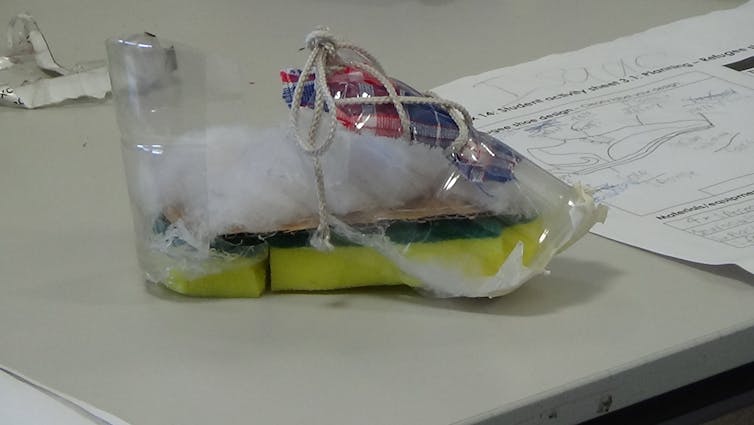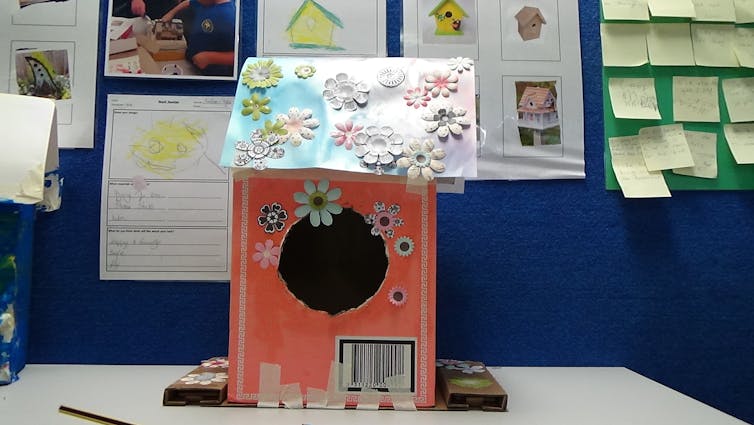'Let's design a waterproof shoe for a refugee child': how to teach science and maths so students actually care
- Written by Paula Mildenhall, Associate Dean (Teaching and Learning), Edith Cowan University
In a May 2019 speech, Australia’s Chief Scientist, Alan Finkel, noted participation in science and maths was slipping in Australian schools. Specifically speaking about STEM (science, technology, engineering and mathematics), he said:
STEM education addresses real world problems and is useful to us and the wider community in many, many ways.
Finkel’s predecessor made similar assertions, arguing many countries are taking substantial action to address the decline in STEM engagement.
 Australia's STEM workfoce: Science, Technology, Engineering and Mathematics. Report from the office of the Chief Scientist.
STEM education can vary from anything connected to one of the STEM subjects to interdisciplinary integration of the four areas. Students are often discouraged from engaging in STEM, and many have had negative experiences with the subjects.
In 2016, the Western Australian Education Department commissioned the development of a set of modules that promote schools teaching STEM in a way that integrates several subjects. This resulted in the STEM Learning Project (SLP), which we spent the last three years evaluating.
More than 1,000 teachers and school leaders from WA metro and regional areas attended professional development workshops on how to guide students – from kindergarten to year 12 – to find solutions to open-ended, real-world problems.
The teachers applied this knowledge in their classrooms. They helped children research a problem and work together to design solutions.
The projects were varied and included: creating a bridge so animals could cross the road safely, designing a shoe for a refugee child, and finding solutions to the excessive heat experienced in Australia.
Designing a shoe
One project involved eight- and nine-year-old students designing a pair of shoes, using recyclable materials, for a child in a South Sudanese refugee camp.
They researched the conditions in the camp to identify what features the shoes should have. They then used scientific skills to test the suitability of different materials.
The students came up with a variety of designs. Each group used different materials, cutting and sticking them together, while referring to their designs.
Australia's STEM workfoce: Science, Technology, Engineering and Mathematics. Report from the office of the Chief Scientist.
STEM education can vary from anything connected to one of the STEM subjects to interdisciplinary integration of the four areas. Students are often discouraged from engaging in STEM, and many have had negative experiences with the subjects.
In 2016, the Western Australian Education Department commissioned the development of a set of modules that promote schools teaching STEM in a way that integrates several subjects. This resulted in the STEM Learning Project (SLP), which we spent the last three years evaluating.
More than 1,000 teachers and school leaders from WA metro and regional areas attended professional development workshops on how to guide students – from kindergarten to year 12 – to find solutions to open-ended, real-world problems.
The teachers applied this knowledge in their classrooms. They helped children research a problem and work together to design solutions.
The projects were varied and included: creating a bridge so animals could cross the road safely, designing a shoe for a refugee child, and finding solutions to the excessive heat experienced in Australia.
Designing a shoe
One project involved eight- and nine-year-old students designing a pair of shoes, using recyclable materials, for a child in a South Sudanese refugee camp.
They researched the conditions in the camp to identify what features the shoes should have. They then used scientific skills to test the suitability of different materials.
The students came up with a variety of designs. Each group used different materials, cutting and sticking them together, while referring to their designs.
 A waterproof shoe designed by a year 3 class for a child in a refugee camp.
Author provided
A year 3 class created the shoe pictured above. It was made of clear plastic material as the class identified the importance of the shoe being waterproof.
The teacher who facilitated this activity said:
Both boys and girls enjoyed the work and they were highly engaged in every part, even the mathematics, and I have children that are not engaged in maths [who] really struggle.
One of the students said:
I enjoyed when we were designing our shoes ’cos we could work as a group.
Another student said they would want to do this every term because it made them creative and they could use their imagination.
Read more:
Don’t just solve for x: letting kids explore real-world scenarios will keep them in maths class
Designing a birdhouse
In an education support centre, a class of 14 students in years 4 to 6 worked on designing a home for a crow named Russell, who visited the school grounds and had a damaged wing.
Students created designs of the birdhouse and then produced 3D versions of them.
At this stage, members of the local Men’s Shed visited the school to view the designs. The men combined the best elements to produce a wooden version for Russell.
The birdhouse pictured below was a 3D cardboard box version of the students’ design. The groups were asked to consider aesthetics and functionality and this birdhouse managed to address both.
A waterproof shoe designed by a year 3 class for a child in a refugee camp.
Author provided
A year 3 class created the shoe pictured above. It was made of clear plastic material as the class identified the importance of the shoe being waterproof.
The teacher who facilitated this activity said:
Both boys and girls enjoyed the work and they were highly engaged in every part, even the mathematics, and I have children that are not engaged in maths [who] really struggle.
One of the students said:
I enjoyed when we were designing our shoes ’cos we could work as a group.
Another student said they would want to do this every term because it made them creative and they could use their imagination.
Read more:
Don’t just solve for x: letting kids explore real-world scenarios will keep them in maths class
Designing a birdhouse
In an education support centre, a class of 14 students in years 4 to 6 worked on designing a home for a crow named Russell, who visited the school grounds and had a damaged wing.
Students created designs of the birdhouse and then produced 3D versions of them.
At this stage, members of the local Men’s Shed visited the school to view the designs. The men combined the best elements to produce a wooden version for Russell.
The birdhouse pictured below was a 3D cardboard box version of the students’ design. The groups were asked to consider aesthetics and functionality and this birdhouse managed to address both.
 A birdhouse designed for Russell the crow, who has a damaged wing.
Author provided
One of the teachers said the project was wonderful and all the children could contribute their specific abilities. She said:
Boys and girls both loved it […] they added their own touch with decorating their models and birdhouses.
The teacher also noted the benefits of involving the community, saying this made the students feel their work was of value.
Schools should do this more
Our evaluation found that, due to the hands-on nature and authenticity of the tasks, nearly all students were enthusiastic and engaged.
A teacher whose year 4 students worked to address the decline of bees, said:
The kids loved it. Whenever they see STEM on the board in the morning they go “yes”. […] I think because there is that element of creativity it does cater to everybody’s abilities […] everyone had a feeling of success.
Another teacher, who worked with kindergarten students to design a bridge for animals, explained this approach catered
[…] for a wider selection of learning styles. More children were engaged.
Schools need to put more emphasis on this type of interdisciplinary STEM learning. Our evaluation shows it helps children remain engaged in STEM subjects while developing important skills for their future.
Read more:
More teens are dropping maths. Here are three reasons to stick with it
The Stem Learning Project is a joint undertaking of a consortium in STEM education comprised of the Educational Computing Association of WA (ECAWA), the Mathematical Association of WA (MAWA), the Science Teachers Association of WA (STAWA) and Scitech.
A birdhouse designed for Russell the crow, who has a damaged wing.
Author provided
One of the teachers said the project was wonderful and all the children could contribute their specific abilities. She said:
Boys and girls both loved it […] they added their own touch with decorating their models and birdhouses.
The teacher also noted the benefits of involving the community, saying this made the students feel their work was of value.
Schools should do this more
Our evaluation found that, due to the hands-on nature and authenticity of the tasks, nearly all students were enthusiastic and engaged.
A teacher whose year 4 students worked to address the decline of bees, said:
The kids loved it. Whenever they see STEM on the board in the morning they go “yes”. […] I think because there is that element of creativity it does cater to everybody’s abilities […] everyone had a feeling of success.
Another teacher, who worked with kindergarten students to design a bridge for animals, explained this approach catered
[…] for a wider selection of learning styles. More children were engaged.
Schools need to put more emphasis on this type of interdisciplinary STEM learning. Our evaluation shows it helps children remain engaged in STEM subjects while developing important skills for their future.
Read more:
More teens are dropping maths. Here are three reasons to stick with it
The Stem Learning Project is a joint undertaking of a consortium in STEM education comprised of the Educational Computing Association of WA (ECAWA), the Mathematical Association of WA (MAWA), the Science Teachers Association of WA (STAWA) and Scitech.
Authors: Paula Mildenhall, Associate Dean (Teaching and Learning), Edith Cowan University





